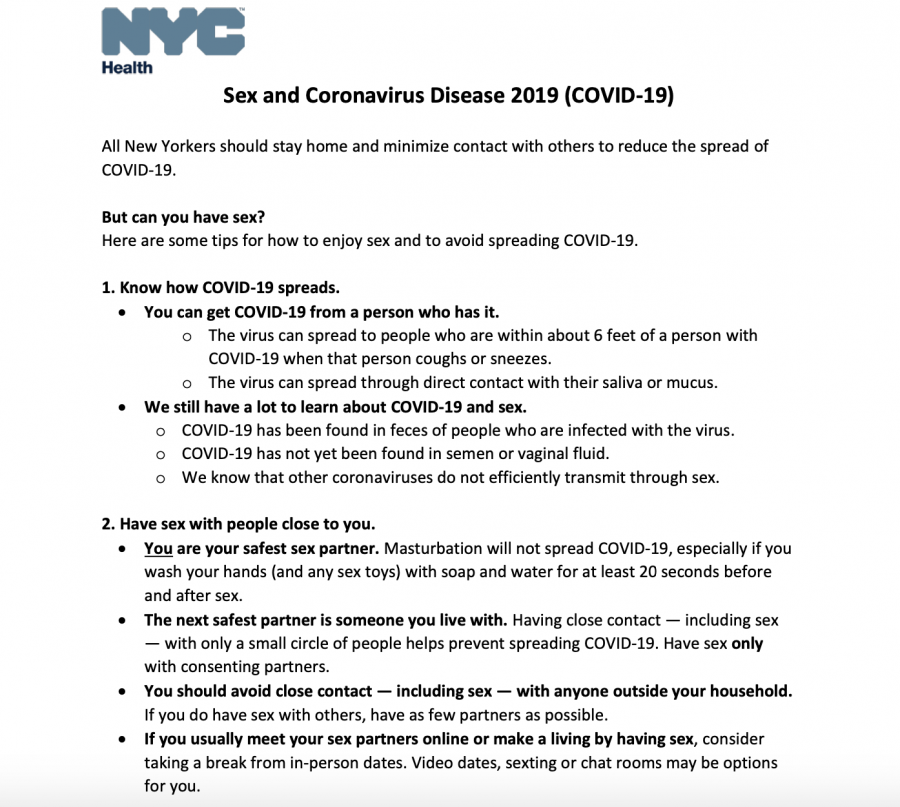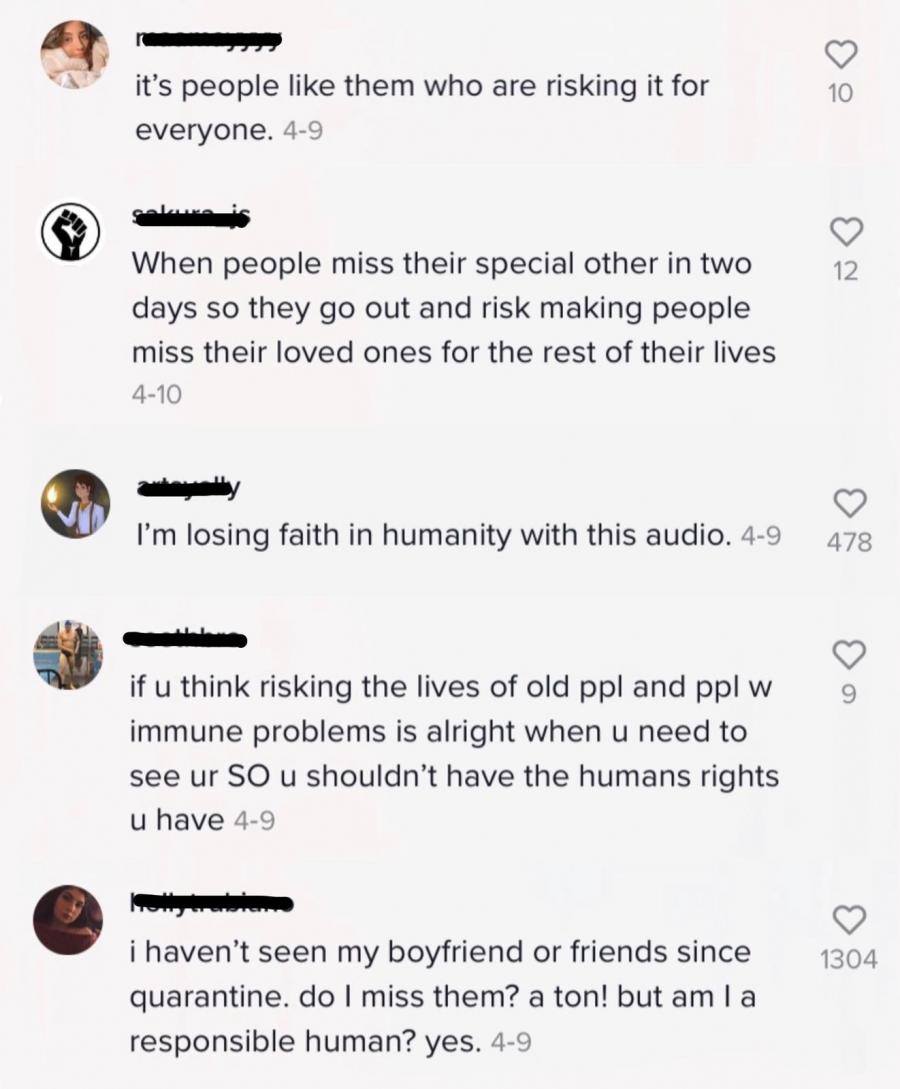
Sexual monsters in a pandemic
During the corona crisis, norms around individual behavior have significantly changed, and so have norms around sexual behavior. In this article, we will be looking at moralized behavioral scripts regarding sexual behavior in the times of corona, touching on what Foucault described as "sexual monsters," and how the meaning of the concept of sexual monster has changed in the context of the corona crisis. To what extent is Foucault's theory still applicable in the context of a global pandemic?
Given that in these uncertain times, rules and regulations are subject to constant change, this article's focus will be placed on the situation in April and the beginning of May of 2020. We will use a Foucauldian lens to approach contemporary examples, such as videos on digital platforms and their comments, to explore how norms around sexual activity are moralized in society during the corona crisis.
Social distancing and sexual behavior
As the coronavirus started to spread globally at the end of February and the beginning of March, many governments started to introduce rules to hopefully slow down the spread of the disease. In the Netherlands for example, the first rule was that people were no longer allowed to shake hands. This quickly progressed to the advice to stay at home as much as possible and having to keep at least 1,5 meters distance from each other. Many other countries have had similar rules, including the United States of America.
Many organizations, such as the NYC Health Department (Figure 1) and Soa Aids Nederland (STI Aids Netherlands), have published advice concerning sexual activity during the corona crisis. The overall recommendation is to have as little sex as possible with people beyond one’s household, as this goes against the social distancing rules and the advice of the government. The NYC Health Department's document also specifically indicates that certain sexual activities with other people can easily cause the spread of the virus. Documents like the one pictured below create a set of rules that people can refer to and moralize, which will be discussed further below.

Figure 1. Sex and Coronavirus tips by the NYC Health department
To find out how these rules are dealt with on a more individual level, we will turn to social media. We will analyze some posts and reactions to them, in order to create an image of how these rules are moralized. On the popular app TikTok - where users can make videos to audio tracks made by other users - a new trend has surfaced where people actively and jokingly ignore social distancing rules and make a video about it. A collection of these videos can be found under this specific audio made by user @jujuonthatbeat._. The audio starts with the words “You should only leave your house if you need something that’s essential, it has to absolutely be a necessity,” followed by the song lyrics “Oops, my heart went oops.” The sound has gained a lot of attention and by now it has spawned more than 14 thousand videos, many of which are sexually themed.
"When you kill grandpa but piping Kyle was a necessity"
One video in this trend shows a girl ignoring the regulations to go visit her boyfriend. Another user has made a video reacting to this, with the caption “When you kill grandpa but piping Kyle was a necessity.” In another TikTok within this audio, a user also captures the process of meeting up with her boyfriend. The video ends with a scene of the inside of a steamy car, with the boyfriend in the passenger’s seat. The steamy windows hint not-so-subtly to the fact that the couple just had sex in the car. Both of these videos are examples of confessions of sexual activity which disregards social distancing policies.

Figure 2. Comments on sexuality confession videos
Even when both confession videos had their comments turned off - likely due to an influx of negative comments - people were still able to leave their thoughts on the former video discussed by commenting on the reaction video. These reactions were overwhelmingly negative towards the couple (see Figure 2). One comment, for example, reads “i haven’t seen my boyfriend or friends since quarantine. do i miss them? a ton! but am I a responsible human? yes.” This commenter has clearly accepted the rules given by official institutions as norms for themselves and has attached moral judgment to them. As the couple does not follow the advice - and thus goes against the commenter's norms - the commenter judges them as irresponsible people.
Moral behavioral scripts
What we see here, especially in the comments, is the emergence of moralized behavioral scripts (MBSs). “Such scripts can best be described as imaginable situations in marked (i.e. nonrandom) spacetime, provoking enregistered (and therefore normative, expected and presupposed) modes of behavior.” People’s behavior is subjected to moral judgments from other people, who have certain expectations and norms of behavior of their own, which in the case of the corona crisis are often based on official regulations on social distancing. The way in which people follow these norms is used as a tool for judging if they are good citizens or not.
People attach very strong normative judgments to the MBSs: the comments above indicate a certain abnormality of those participating in this trend. One comment states “it’s people like them who are risking it for everyone.” They’re not only abnormal because they violate policies from the government, but they are a risk to society because they are possibly putting the health of other people in danger. Ignoring social distancing rules to have sex marks them as risks and identifies them as irresponsible people.
They let their sexual desires overrule their rationality, which could possibly be fatal in this context.
These MBSs are context-specific, as they are only applicable in current times. In the times of this pandemic, sex with other people can have an effect that goes beyond the private sphere of the people involved, namely increasing the chances of spreading the virus further; therefore, people who do it are marked as a risk. They are deemed irresponsible because they let their sexual desires overrule their rationality, which could possibly be fatal in this context. If these TikToks were posted in the time before this pandemic, the chances of the couples being marked as risks were likely to be a lot lower or non-existent, as they would not be potentially spreading a disease.
This also connects to Foucault's notion of sexual monsters, which now has a slightly different meaning than it did before the pandemic. Foucault defined a sexual monster as someone who practices monstrous behavior that violates sexual laws, for example, the rape of women. Now, however, even the sole act of going out to have sex with another person can result in an individual being regarded as a sexual monster, because they let their sexual desire control them without thinking about the norms and regulations, and the potential risks to society.
The masturbator
An important thing to note is that sex with someone else is not the only way to fulfill one’s sexual desires. There are many other options, such as masturbation. Where masturbation used to be looked down upon by society and sex used to be considered "cool," masturbation is now the preferred method for fulfilling one's sexual desires, as will be explained below.
The moral judgments regarding sexual behavior seem to have been turned around. On many occasions, officials are openly talking about sexual behaviors, and specifically masturbation, in an attempt to regulate sexuality and promote masturbation over sex with someone else. For example, NYC Health (Figure 1) stated that “You are your safest sex partner.” The department advises that, if you want to avoid spreading the virus but still want to enjoy sex, masturbation is the safest way because there is only one person involved. Soa Aids Nederland (STI Aids Netherlands) also lists a few safe sex options, for example, sexting or phonesex - which could be done in a group on Zoom or Microsoft Teams - webcam sex and stripteases, sex using a vibrator with remote control, or (mutual) masturbation at 1.5 meters distance. After the corona crisis, it is likely that the advised sexual acts will change again.
Just like the TikTok examples described earlier about having sex with someone else, there also are TikToks about masturbation linked to our current time. One video is captioned “me being h0rny all the time realising i’ll be in isolation for the next few months” (where the “0” replacing the “o” in the word “horny” is presumably a way of trying to avoid TikTok taking down the video because of their guidelines regarding sexual content). This video uses a different variation of the audio described earlier: this TikTok sound consists of the song lyrics “Oops, my heart went oops” followed by the sound that is played at the beginning of many videos on PornHub. This video is one example of the many videos made referencing watching porn and masturbation that were made to this audio track.
The moral judgments are not the same for every form of sexual behavior.
As described earlier, deviating from the current norms regarding going out to have sex with someone is faced with negative moral judgment. However, the moral judgments are not the same for every form of sexual behavior. In contrast to the negative moral judgment regarding sex with someone else, masturbation is seen in a more positive light, as it does not require contact with other people. This can also be seen in the comments of the aforementioned video: there are no comments marking the user as irresponsible or a risk; the commenters mention that they find it relatable (Figure 3).

Figure 3. Comments on TikTok about masturbation
Comparing the comments on the TikToks with confessions of having sex with other people to the comments on the TikTok about masturbating, a clear pattern can be found in terms of moralized behavioral scripts. One the one hand, ignoring social distancing policies to have sex with another person is very negatively judged. The couples were identified as irresponsible people and marked as risks to society. On the other hand, staying at home and masturbating is accepted and regarded as relatable. This means that not only do people have normative judgments regarding social distancing, but they also have normative preferences towards certain kinds of sexual behavior - namely masturbation over sex with someone else - which entail moral judgments and the identification of responsible and irresponsible citizens.
Conclusion
What is considered "abnormal" when it comes to sexual behavior differs during the corona crisis compared to what was judged as abnormal before. Because of social distancing policies and individual judgments, new norms for sex are constructed. With these new norms, new moral behavioral scripts emerge. There are very strong normative judgments attached to these moral behavioral scripts: the individuals who ignore the regulations in order to have sex are marked as a risk because their way of fulfilling their sexual desire increases the chances of spreading the virus further. During the corona crisis, letting one’s sexual desires take over their rationality is regarded as irresponsible and dangerous. In contrast to this, masturbation is not faced with such negative moral judgments. It is seen as more tolerable in the current situation and many mention that they find this kind of sexual behavior relatable. Having sex with yourself is recommended over sex with others because it involves only yourself, and therefore the risk of spreading the virus is kept as low as possible.